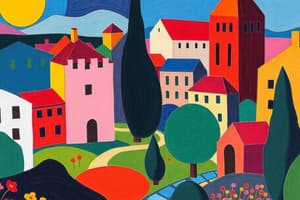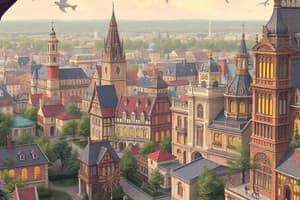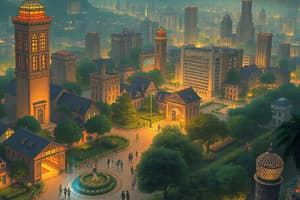Podcast
Questions and Answers
What was the primary purpose of the Garden City Association established by Howard in 1899?
What was the primary purpose of the Garden City Association established by Howard in 1899?
- To promote agricultural techniques.
- To design residential buildings.
- To develop transportation networks.
- To provide financial machinery for urban planning proposals. (correct)
Which Garden City was the first to be developed and when did it begin?
Which Garden City was the first to be developed and when did it begin?
- Letchworth, in 1902 (correct)
- Hampstead, in 1910
- Welwyn, in 1920
- Letchworth, in 1900
What unique feature characterized the plan of Letchworth Garden City?
What unique feature characterized the plan of Letchworth Garden City?
- Strict grid layouts for streets.
- High-rise buildings dominating the skyline.
- A focus solely on industrial zones.
- Landscaping and informal street layouts. (correct)
Which design element was emphasized in the development of Welwyn Garden City?
Which design element was emphasized in the development of Welwyn Garden City?
The Hampstead Garden Suburbs were designed primarily for what purpose?
The Hampstead Garden Suburbs were designed primarily for what purpose?
What motivated the City Beautiful movement that began around 1891?
What motivated the City Beautiful movement that began around 1891?
How large was Letchworth Garden City when it was completed?
How large was Letchworth Garden City when it was completed?
Which aspect of urban planning did the City Beautiful movement primarily focus on?
Which aspect of urban planning did the City Beautiful movement primarily focus on?
Who spearheaded the City Beautiful Movement with his designs?
Who spearheaded the City Beautiful Movement with his designs?
What is a notable feature of the urban design of Brasilia?
What is a notable feature of the urban design of Brasilia?
Which architect took over the master plan of Chandigarh after Albert Myer?
Which architect took over the master plan of Chandigarh after Albert Myer?
What aspect of Chandigarh's design reflects Le Corbusier's influence?
What aspect of Chandigarh's design reflects Le Corbusier's influence?
Which two types of centers are separated along one axis in Brasilia's design?
Which two types of centers are separated along one axis in Brasilia's design?
What design principle is prominently applied in Chandigarh’s layout?
What design principle is prominently applied in Chandigarh’s layout?
What was the population size that Le Corbusier planned for Le Contemporaine?
What was the population size that Le Corbusier planned for Le Contemporaine?
Which of the following statements best characterizes the City Beautiful Movement?
Which of the following statements best characterizes the City Beautiful Movement?
Which feature was prominently included in the design of Le Contemporaine?
Which feature was prominently included in the design of Le Contemporaine?
What was Frank Lloyd Wright's proposal for the living conditions of families in the U.S.?
What was Frank Lloyd Wright's proposal for the living conditions of families in the U.S.?
Which city was designed by Lucio Costa with major influence from Le Corbusier?
Which city was designed by Lucio Costa with major influence from Le Corbusier?
What height did Frank Lloyd Wright propose for the Mile High Tower?
What height did Frank Lloyd Wright propose for the Mile High Tower?
Who proposed the concept of the Linear City?
Who proposed the concept of the Linear City?
What does the Barbican Development represent?
What does the Barbican Development represent?
What was a significant criticism of Frank Lloyd Wright's vision for land use?
What was a significant criticism of Frank Lloyd Wright's vision for land use?
What unique aspect did Kiyonori Kikutake propose in his Floating City idea?
What unique aspect did Kiyonori Kikutake propose in his Floating City idea?
What was the primary reason for the location of the earliest towns?
What was the primary reason for the location of the earliest towns?
What was the barangay?
What was the barangay?
Which of the following was NOT part of the Laws of the Indies?
Which of the following was NOT part of the Laws of the Indies?
What key feature surrounded the Plaza Complex according to the guidelines set by the Laws of the Indies?
What key feature surrounded the Plaza Complex according to the guidelines set by the Laws of the Indies?
How large was the area of Intramuros?
How large was the area of Intramuros?
What types of buildings were included within the Intramuros area?
What types of buildings were included within the Intramuros area?
What was a significant outcome of the Reduccion ordinance in 1573?
What was a significant outcome of the Reduccion ordinance in 1573?
Which of the following buildings would typically be found surrounding a plaza during the Spanish Colonial Times?
Which of the following buildings would typically be found surrounding a plaza during the Spanish Colonial Times?
What was the primary characteristic of Quiapo in Manila?
What was the primary characteristic of Quiapo in Manila?
Which area in Manila became recognized as the first commercial district?
Which area in Manila became recognized as the first commercial district?
What was the significance of San Miguel in the context of Manila's urban design?
What was the significance of San Miguel in the context of Manila's urban design?
Which community served as the first 'University Town' in Manila?
Which community served as the first 'University Town' in Manila?
What distinguishes Malate in Manila's urban development?
What distinguishes Malate in Manila's urban development?
Which area was built by the Americans to house oil depots?
Which area was built by the Americans to house oil depots?
Which town in Manila is characterized by streets of specialized categories like ceramics and soap?
Which town in Manila is characterized by streets of specialized categories like ceramics and soap?
What does the area of Ermita in Manila primarily represent?
What does the area of Ermita in Manila primarily represent?
Flashcards are hidden until you start studying
Study Notes
Garden Cities
- The Garden City Association was established by Ebenezer Howard in 1899 to provide financial assistance for the realization of his proposals.
- Letchworth (first garden city) was started in 1902, designed by Raymond Unwin and Barry Parker.
- It combined landscaping, informal street layouts, and a main axis focusing on a town center.
- It was built on 4,500 acres, with 3,000 acres for agricultural uses and 1,500 for the city.
- Welwyn (second garden city) was built in 1920, designed by Louis de Soisson.
- It brought formality and Georgian taste in a smaller land area of 2,400 acres.
- The town's focal point was a mile-long mall with beautiful Georgian houses and shops.
- Hampstead Garden Suburbs was meant for housing with a variety of housing types lined along streets which terminated on civic buildings in a large common green.
City Beautiful Movement
- The start of the movement is vague, but theorists suggest it began with the Columbian Exposition in 1891.
- The movement emphasized grand formal design with social motives.
- Daniel Burnham spearheaded the movement, with his designs of Chicago and the famous axiom: "Make no little plans, they have no magic to stir men’s blood."
The New Capitals
- The City Beautiful Movement spread to different parts of the world.
- Nations sought grand designs for their new capitals, inviting proponents of the movement to partake.
- Brasilia (new capital of Brazil) was a completely new 20th-century city designed by Lucio Costa, with strong influence from Le Corbusier.
- It was designed with two huge axes in the sign of the cross, with major traffic arteries traversing them.
- Separate centers for government, commerce, and entertainment are located along one axis, with residential districts distributed around the other.
- Oscar Niemeyer designed many of its buildings.
- Chandigarh (India) was planned to be the capital of the Punjab province after the separation of India and Pakistan.
- Albert Mayer designed the original masterplan, but Le Corbusier eventually took over.
- It was designed with a regular grid of major roads for rapid transport, surrounding residential "superblocks" based on rectangles, measuring 800 x 1200 meters.
- The plan is a large-scale application of the Radburn principle, regularized by Le Corbusier's preference for the rectilinear and monumental.
- Le Corbusier also planned Le Contemporaine, designed for a population of 3,000,000 people.
- It consisted of high-rise office and residential buildings with a greenbelt for institutions and recreational areas.
- Industrial areas were situated beyond this.
- Le Corbusier also planned Unite d’ Habitation.
- It was designed with a grid pattern of superblocks, 200 by 400 meters.
- Transit was underground.
Radical Ideas
- Broadacres by Frank Lloyd Wright proposed that every family in the US live on one acre of land, in a city with all necessary amenities.
- Critics argued that there was not enough land.
- This led to Wright's own translation of high-density living:
- The Mile High Tower proposed housing a significant amount of Manhattan's residents in a mile-high building in order to free up space for green fields. He suggested ten or more towers could replace all Manhattan buildings.
- The Linear City was proposed by Spanish engineer Soria Y Mata.
- The Archology Alternative was proposed by Paolo Soleri.
- The Floating City was proposed by Kiyonori Kikutake.
The Barbican development
- An early type of planned unit development that included all amenities in one compound with multi-level circulation patterns.
Spanish Colonial Times
- In 1573, King Phillip II proclaimed the Laws of the Indies, establishing uniform standards and planning procedures for colonial settlements.
- They provided guidelines for site selection, layout and dimensioning of streets and squares, the location of civic and religious buildings, open space, cultivation and pasturing lands, and even the main procedural phases of planning and construction.
- The Plaza Complex was a result of several ordinances of the Laws of the Indies.
- The plaza was surrounded by important buildings:
- Catholic church
- Municipal or town hall
- Marketplace and merchants stores
- Elementary school
- The homes of the "principalia"
- Other government buildings
Intramuros
- The city was 1.2 sq. km in area, containing large churches, plazas, office and residential buildings, housing 7,000 residents.
- It was surrounded by high walls.
- The population was 190,000 people.
Growth of Manila
- The Arrabales were suburbs that grew outside Intramuros.
- Quiapo was the territory of the illustrados (rich and powerful) and manifested folk religiosity.
- Tondo was a coastal city adjacent to Manila.
- Binondo was a trading port developed by the Chinese and Arabs.
- Sta. Cruz was the main commercial district with shops, movie houses, and restaurants.
- San Nicolas was also a commercial town built by the Spanish, with streets of specialized categories (ceramics, soap, etc.).
- Sampaloc centered on two churches: Our Lady of Loreto and Saint Anthony of Padua. It was known as the first "University Town."
- Later Suburbs:
- San Miguel (Malacañang) was where rest-houses were built for the Spanish government.
- Malate was an early "summer resort" for wealthy Filipinos. It became the first fishing and salt-making town.
- Ermita was an early tourist belt (red-light district).
- Paco was the first town built around a train station.
- Pandacan was a town built by the Americans for oil depots.
Studying That Suits You
Use AI to generate personalized quizzes and flashcards to suit your learning preferences.




